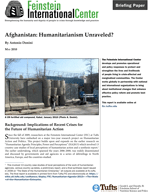Researchers at the Feinstein International Center (FIC) at Tufts University have embarked on a major two-year research project on Humanitarian Action and Politics. This project builds upon and expands on the earlier research on Humanitarian Agenda 2015 — Principles, Power and Perceptions (HA2015) which involved 13 country case studies of local perceptions of humanitarian action and a synthesis report.
Our new research is in two separate but related phases. Phase I is policy-oriented: building on the HA2015 case studies and subsequent field work, it looks at the challenges faced by humanitarian actors in recent crises – Afghanistan, Sri Lanka, Darfur, Somalia, and Pakistan – and at the policy and operational implications for UN agencies, NGOs, and donors. The briefing papers we are issuing look at the policy implications of recent crises and capture widespread feeling that, despite obvious differences in the countries studied, developments in the humanitarian-political relationship are challenging the fundamentals of humanitarian action. These papers are intended to stimulate debate among practitioners and policy-makers. The papers will be further revised and expanded later in 2010.
This publication expands on a briefing paper on Afghanistan issued in March 2009, taking into account developments in the past year. It is based on some 40 interviews with UN and NGO aid agency staff, donors, a selection of Afghan government officials, and Afghan intellectuals and analysts in Kabul in January and March 2010. An earlier draft was circulated in Kabul in late March 2010 as an input into a workshop for aid agencies and donors hosted by ACBAR and supported by OFDA and UN-OCHA.







